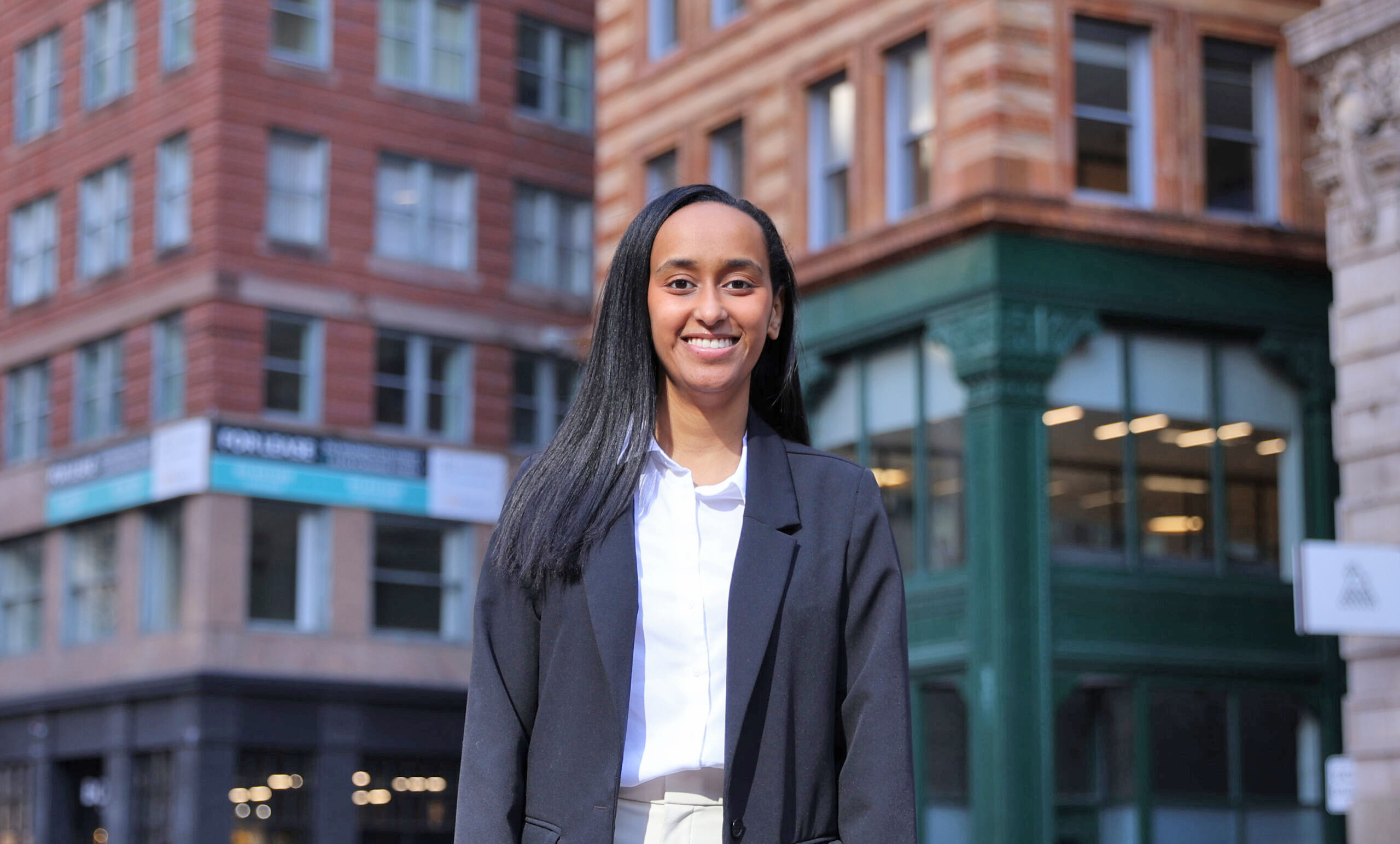Alum Serves as Inaugural Massachusetts Taxpayers Foundation Policy Start Fellow.

Leedya Senbetta (SPH’23)
Alum Serves as Inaugural Massachusetts Taxpayers Foundation Policy Start Fellow
Leedya Senbetta (SPH’23) has worked to become familiar with the state’s finance and public policy landscape to brief the foundation’s partners on consequential health policy issues, such as MassHealth redeterminations.
Last spring, just before graduating from the Master of Public Health program at the School of Public Health, Leedya Senbetta was selected by the Massachusetts Taxpayers Foundation (MTF) to be their inaugural Policy Start Fellow.
Developed in partnership with the Association of Independent Colleges and Universities in Massachusetts (ACIU Mass) and coordinated through SPH’s Career and Practicum Office, the 14-month fellowship aims to expand the pipeline of graduates from underrepresented communities with opportunities in the public and private sectors. The fellowship emphasizes mentoring and networking opportunities while simultaneously supporting MTF’s research capacity and diversity goals. The fellowship is supported by MTF members including AT&T, Baystate Health, Blue Cross Blue Shield of MA, Comcast, Fidelity Investments, Mass General Brigham, and entrepreneur and professor at Hult International Business School Ted Ladd.
Senbetta, who completed certificates in health law, policy and management as well as human rights and social justice, began her MTF fellowship in September 2023. In her role, she has familiarized herself with the state’s finance and public policy landscape to brief MTF members on health policy issues, such as MassHealth redeterminations. Senbetta recently presented the findings of her research on MassHealth redeterminations to MTF’s members. She also has a forthcoming brief that will be publicly available on MTF’s website.
Senbetta explains that, normally, MassHealth annually reviews the income information of its members to determine whether they remain eligible for publicly funded health insurance. If a member no longer qualifies, they are then removed from MassHealth coverage. During the pandemic, however, MassHealth enrollment spiked due to the passage of the Families First Coronavirus Response Act, which incentivized Medicaid programs, such as MassHealth, to keep people continuously enrolled in exchange for federal funding.
“I am writing about how, now that the public health emergency is over, now that COVID is [considered] over on a federal level, what do we do?” says Senbetta. “We have to make sure that the infrastructure for MassHealth is on par to be able to handle this amount of determination, we have to make sure also that people are not losing coverage because they did not respond to renewal notices or something like that. So, it is a huge undertaking.”
Though her research project started off small, it ultimately evolved into a multi-month endeavor, a development Senbetta says she welcomed as she was eager to delve deeper into the subject. Another highlight of her fellowship so far, says Senbetta, has been the two days she was able to spend with MTF partners, the beneficiaries of her research.
Senbetta spent a day shadowing Michael Caljouw, vice president of government and regulatory affairs at Blue Cross Blue Shield of MA and a second day shadowing the government relations and public policy team at Boston Children’s Hospital. She was able to join Caljouw at a Greater Boston Chamber of Commerce Meeting, tour Boston Children’s Hospital, and end both shadowing days at the State House observing the organizations’ lobbyists at work promoting their legislative priorities, such as Boston Children’s efforts to pass the joint state senate and house bill H.1237/S.740: An Act to Ensure Equitable Health Coverage for Children.
Senbetta’s experience as a Policy Start Fellow has solidified her intent to work in health policy, she says. “There is so much to do and so many interesting areas to go into. Really anything [where] I can advocate for advancing health equities would be the ultimate goal because being able to do something that you are passionate about as a career is not something that everybody can do.”
For current students interested in following in her footsteps, Senbetta has one major piece of advice: the importance of networking. She suggests students connect with their professors and keep in touch after graduation. While Senbetta admits that she too has struggled at times to determine where to start building her network, she points out that opportunities exist, such as the Policy Start Fellowship, where there are built-in chances to branch out.
Senbetta herself may never have pursued an MPH, had she not reached out for the advice of others. She was a human biology major during her undergraduate studies at Michigan State University, where many of her peers were interested in patient-facing roles. But when she learned about measures of kidney disease in one of her classes, Senbetta found herself more intrigued by the social and structural determinants of unequal access to kidney transplants than the calculation of individual patients’ rates of filtration. She shared these interests with her counselor and they recommended a career in public health.
With several months remaining in her fellowship, Senbetta looks forward to gaining more professional skills through a second research project, as well as through helping to onboard her replacement, the 2024-2025 Policy Start Fellow. Doug Howgate, president at MTF, shares that he and his team are eager to recruit the next fellow so Senbetta can help them get started.
“We had high hopes as we launched our Policy Start Fellowship to bring in a talented recent graduate to contribute to our research and help them get started in their career,” says Howgate. “[Senbetta] has exceeded the high expectations we started with. She has brought so much to the office and her perspective has added a great deal to our work.”
